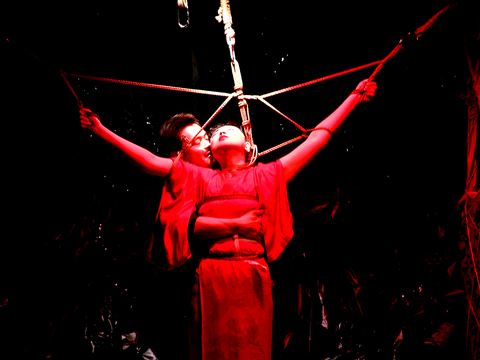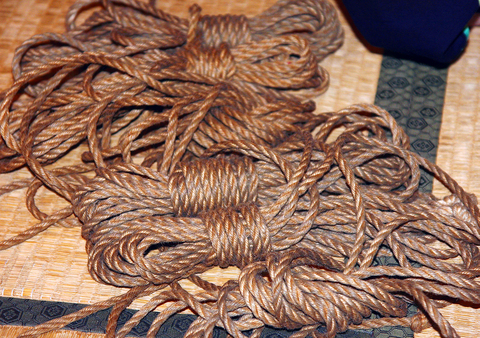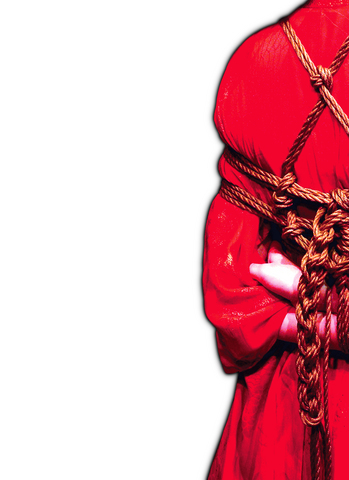"Sir Distic" worked efficiently, quickly binding his pliant subject until she was caught up like a fly in a web, legs spread and arms tied behind her back. He fastened a rope around her neck and then drew her up on a pulley suspended from the ceiling, where she rotated with an ecstatic look on her face.
Last year's first public bondage/domination and sadomasochism (BDSM) show Tie Me Up Tonight barely registered on Taipei's dramatic radar as it played to just 50 people a night, but the video evidence suggests it was one of the sexiest and most groundbreaking performances of the year.
Organized by BDSM Company (皮繩愉虐邦) and the avant-garde Critical Point Theater Phenomenon (臨界點劇象錄劇團) at its former venue in Taipei's Wanhua district, it introduced stars from the Japanese fetish scene, in addition to a young, local model called Maya (舞真夜) who tied herself up in knots. Literally.

PHOTOS COURTESY OF BDSM COMPANY AND EPICURE
Back by popular demand, Maya has added some new tricks to her repertoire and she will be joined tonight at Huashan Culture Park (華山文化園區) by two other practitioners of the dark and erotic arts.
Chiaki Kano has her own SM bar in Japan and is a famed nawashi, which involves being bound by ropes so tight the cords bite into the flesh. Mira Kuruni's performance involves magic, theater, agony and sex. In previous shows he made young women swallow razor blades, poured candle wax onto their private parts and staple gunned them.
According to reviews of Kurumi's DVD Hyper AbnormaliSM Exhibition he nailed labia to planks of wood, pierced breasts with barbecue skewers and carved his name in accomplices' legs, while they were "on the brink of hysteria, but look[ing] at their master with doe-eyed expressions of devotion" (Bizarre Magazine).

Iinda (not her real name) is the producer of Tie Me Up Tonight. She is an eloquent spokesperson for BDSM, which is not surprising since it is the subject of her master's thesis.
"BDSM is a different kind of sexuality. We use power to invoke a sexual feeling and provide sexual pleasure. It can be about dressing up or performance. The point of all this [the show] is law and rights. We are being mildly provoking because we are fighting for our rights as BDSMers," Iinda said.
She has a point. As Grace Zhan (詹慧玲) of Critical Point Theater argued at a gathering of BDSM adherents last weekend, "In Japan, Europe and elsewhere these kind of activities are seen as natural. Here it is more complicated and because people don't understand it they don't like it."

It is not a question of legal restraints. There is nothing to prevent consenting adults doing pretty much what they want in private; though Article 234 of the Criminal Code (刑法) states that a person who publicly commits an indecent act shall be punished with detention or a fine.
Epicure (not his real name) said Taiwan is "intolerant of difference" and that is why there has not been a BDSM scene here. In fact, the activity has been so marginalized up to this point that it is sometimes, almost unbelievably, confused with Buddhism (bdsm).
BDSM is in much the same position that homosexuality was 10 years ago, Epicure said. But with international exchanges, the Internet and translations of "sensation play" literature this is changing. Two years ago BDSM joined the ranks of other sexual minority groups in the annual Taiwan Pride Parade.

According to research from the Kinsey Institute, in 1990, around 5 percent to 10 percent of Americans are into some form or another of BDSM. There are no similar studies for Taiwan but common sense suggests the figures would be much the same. As society becomes more accepting of differences people open up about their preferences and indulge them.
After all, homosexuality used to be a crime or regarded as a mental illness in many countries, but this is the case now only under the most repressive or backward regimes. In fact you could argue that a society's tolerance to its minorities is a marker of its maturity and "progress."
Currently in Taiwan there are a few Internet SM-themed chat rooms, bulletin boards and the occasional low-pressure event, which is called a "munch." BDSM Company is leading the way, hence the Tie Me Up Tonight event tonight, which Iinda said allowed "normal" or "vanilla" people a window on BDSM without feeling weird. "In the theater, the mood is different," she said.
For Iinda these performances are a socially acceptable way of inserting BDSM into the mainstream. Asked to explain why, as a human-rights campaigner, she would encourage people to deny or waive rights in a sexual-power situation, her answer was illuminating.
"This is my SMer paradox. As a teenage woman I was a feminist, so it may seem strange for me now to push for something that may involve female submissiveness. Even so, I would say I have a right to pain," Iinda said, adding the analogy of a feminist wearing pretty clothes was similar. Wanting to look good doesn't mean there should be inequality.
At the BDSM gathering last weekend, held at a quaint teashop near National Taiwan University (國立台灣大學), there were intense discussions about the pornographic aspects of performances and why it was that guys were generally administering pain to a pretty, young woman and not vice versa. It was obvious BDSM attracted people for different reasons.
Epicure said he got into BDSM as a student in England where, incidentally, he met his Japanese wife and SM partner Akaneko. He equated love of pain with the enjoyment of spicy food. "Some like it hot."
He said he spent six months under a BDSM master in Japan learning the arts of bondage and the special knots that are used. He emphasized that safety was paramount.
As for Akaneko, she explained that from the age of five or six she dreamed of being bound, whipped and imprisoned. She speculated that it might have been due to the influence of manga comics or television.
"It is not so important to me now. I can live without it," she admitted after Epicure left the discussion. ""He likes it a lot so I want to please him. I only like spicy food occasionally."
What: Artistic bondage, sadomasochistic and fetish performances
Where: Huashan Culture Park (華山文化園區) at 1 Bade Rd Sec 1, Taipei (台北市八德路一段1號)
When: Tonight from 8pm to 10pm, tomorrow and Sunday with performances from 3pm to 5pm and 8pm to 10pm.
Tickets: NT$600 available through NTCH ticketing or at the door
Further information: Visit www.bdsm.com.tw/nawatsuya, or call BDSM Company on 0920-354-201 or Critical Point Theater Phenomenon on 0912-560-593

Mongolian influencer Anudari Daarya looks effortlessly glamorous and carefree in her social media posts — but the classically trained pianist’s road to acceptance as a transgender artist has been anything but easy. She is one of a growing number of Mongolian LGBTQ youth challenging stereotypes and fighting for acceptance through media representation in the socially conservative country. LGBTQ Mongolians often hide their identities from their employers and colleagues for fear of discrimination, with a survey by the non-profit LGBT Centre Mongolia showing that only 20 percent of people felt comfortable coming out at work. Daarya, 25, said she has faced discrimination since she

April 21 to April 27 Hsieh Er’s (謝娥) political fortunes were rising fast after she got out of jail and joined the Chinese Nationalist Party (KMT) in December 1945. Not only did she hold key positions in various committees, she was elected the only woman on the Taipei City Council and headed to Nanjing in 1946 as the sole Taiwanese female representative to the National Constituent Assembly. With the support of first lady Soong May-ling (宋美齡), she started the Taipei Women’s Association and Taiwan Provincial Women’s Association, where she

It is one of the more remarkable facts of Taiwan history that it was never occupied or claimed by any of the numerous kingdoms of southern China — Han or otherwise — that lay just across the water from it. None of their brilliant ministers ever discovered that Taiwan was a “core interest” of the state whose annexation was “inevitable.” As Paul Kua notes in an excellent monograph laying out how the Portuguese gave Taiwan the name “Formosa,” the first Europeans to express an interest in occupying Taiwan were the Spanish. Tonio Andrade in his seminal work, How Taiwan Became Chinese,

More than 75 years after the publication of Nineteen Eighty-Four, the Orwellian phrase “Big Brother is watching you” has become so familiar to most of the Taiwanese public that even those who haven’t read the novel recognize it. That phrase has now been given a new look by amateur translator Tsiu Ing-sing (周盈成), who recently completed the first full Taiwanese translation of George Orwell’s dystopian classic. Tsiu — who completed the nearly 160,000-word project in his spare time over four years — said his goal was to “prove it possible” that foreign literature could be rendered in Taiwanese. The translation is part of